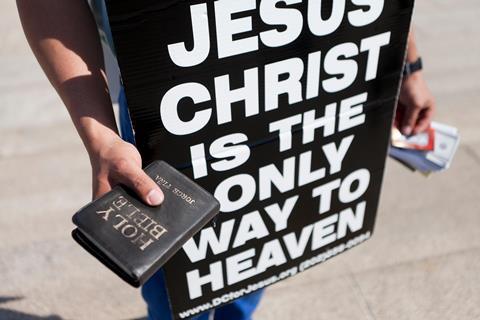The re-evangelisation of Europe will require white and minority ethnic Christians to work together, says Harvey Kwiyani. Both groups have much to learn from the other, he says. Only then will revival come to our shores

Congregations of migrant Africans, Asians and Latin Americans are on the rise across the UK and have become an important part of the country’s Christian landscape. There is not a city here that does not have several UK Minority Ethnic (UKME) congregations. In London, for example, Christians from an African or Caribbean background form only a small percentage of the capital’s population, yet they make up the majority of church attendance on any Sunday.
Researchers exploring church planting and church growth in the UK agree that most new churches in our cities are planted by African, Asian or Latin American migrants. Whether one considers London, Liverpool, or Glasgow, more than 60 per cent of new churches are planted by foreign-born pastors and are catering to UKME communities.
Called by God
The fact that Christians who have migrated from around the world are able to establish and lead churches in the UK is good news. We get to enjoy God’s great gift of diversity that shapes the body of Christ around the world. We can enjoy a foretaste of the worship of the multitudes of peoples of all nations, tribes and tongues that John describes in Revelation 9.
We also recognise that, for many, belonging in a monocultural UKME congregation is not a preferred choice - they would like to worship with their neighbours, whoever those neighbours are. As a result, most migrant congregations want to evangelise beyond their own migrant communities. But many lack the know-how. They wholeheartedly believe that they are missionaries, sent by God to the UK at such a time as this, to evangelise descendants of the people who shared the gospel with their own ancestors many decades ago.
Evangelism can best happen as a joint effort between sensitive outsiders and wise insiders
In 2019, just before the Covid-19 pandemic, I led a seminar on cross-cultural evangelism at an African church in the Midlands. The seminar highlighted the fact that most of the congregation’s evangelists and evangelism methods were ill-suited for their city. They evangelised like they did in Accra, Lagos, Nairobi or Johannesburg, depending almost exclusively on the distribution of tracts on the high street.
This worked well in Africa but didn’t produce results in Europe. As a result, the church leaders had little to show for 12 years of evangelising. They had given out tens of thousands of gospel tracts, yet not a single person had visited their church in response. The little growth they had seen was due to the migration of other Africans to their city.
In the seminar, one pastor shared a story of a young white British man who stopped to look at the tract he had just been given. After pondering for a few minutes, he said: “This Jesus seems like exactly what I need. How do I respond?” The pastor was so overwhelmed by his question that her brain froze (and, as she put it, her anointing escaped). All she could say in response was: “Let God arrest you and the Holy Spirit will deliver you.” Perplexed and frustrated, the young man walked away and never returned.
Context is key
This story reflects a typical experience among many African Christians in Europe. There is a zeal to evangelise, but methods that worked in Africa are not appropriate in Europe. And attempting to convert non-religious Europeans to African Pentecostalism is quite an uphill task - the culture in which African Pentecostalism thrives is too different from that of Europe. Then there are the racial and colonial dynamics - will African missionary work in Europe be like that of the Europeans in Africa?
Whatever evangelism strategies are used, they must reflect an awareness of the context in which the gospel is being preached. We cannot evangelise in Liverpool the way we do in Lagos. The gospel is the same, but the culture determines how it is received and must, therefore, shape how it is communicated.
The re-evangelisation of Europe depends on foreign Christians living and serving in her cities today
The growing presence of UKME Christians in our cities offers us a perfect opportunity for cross-cultural ministry. Often, foreign Christians come with the zeal to evangelise but little understanding of the European cultural context. European Christians know their context well but, often, they need to reimagine evangelism, too. Both UK and UKME Christians have cultural blindspots that prevent them from seeing the whole picture. They need to work together to see what God is doing.
One of my elders used to say: “mission and evangelism can best happen as a joint effort between sensitive outsiders and wise insiders.” To evangelise the UK again, both UK and UKME Christians need to work together. Of course, mission in contexts of cultural diversity needs multi-ethnic teams. Segregated missionary work is unfaithful to God’s call for us to evangelise the multicultural peoples of the UK.
For this reason, I find hope in the students that I teach. Those joining the Church Mission Society’s pioneer mission training on the African Christianity pathway come from different background and have different skills. Together, they explore the history of African Christianity and consider mission in their own current contexts.
I remain persuaded that the re-evangelisation of Europe will depend on the work of the many foreign Christians living, working and serving in her cities today. It is my hope that we can find ways to work together, especially in our mission and evangelism efforts. How we do this will determine how effective our witness will be.



































No comments yet